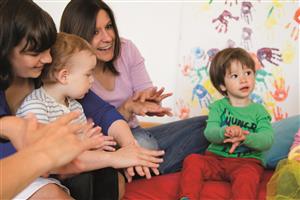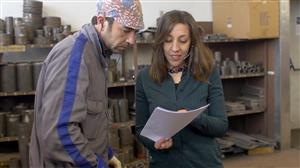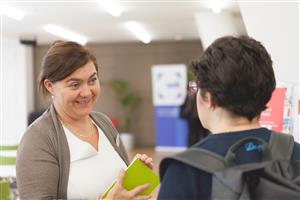Search Results
Search
Filter results
Advanced Filters
Your search returned 314 Solutions
-
Preventing bullying in English schools
A variety of resources have been developed to raise awareness at English schools. These include materials on how to challenging offensive language, a language guide, and a history of disability harassment and bullying. The tools are now available for all students, parents, and teachers on the Anti-Bullying Alliance website.
World of Inclusion, United Kingdom -
Training the teachers and their trainers in Inclusive Education
A key part of the programme is the provision of training courses on Inclusive Education at the Armenian State Pedagogic University, where there are two compulsory and two optional courses on Inclusive Education. 200 mainstream schools are supported to become inclusive and some 5,000 teachers from these schools are beiing trained.
Bridge of Hope, Armenia -

Bilingual Classes Supporting Families to Learn Sign Language Together
Using a team of one person who is deaf and one who can hear, kinderhände offers bilingual classes in German and ÖGS to children aged six months to 14 years and their families. It also has an online platform for families to use at home, and has developed teacher-training modules to support ÖGS use in schools.
kinderhaende e.V., Austria -
Flanders’ Personal Assistance Budget
The most important feature of Flanders´ Personal Assistance Budgets (PAB) is that the person with disabilities (or their representatives) controls both the assistance and the assistance budget, not the assistance provider. A multi-disciplinary team assesses and decides the budget each user receives, depending on his or her support needs.
VAPH - Flemish Agency for Persons with Disabilities, FLEMISH GOVERNMENT DECREE ON THE PROCEDURES FOR GRANTS (PERSONAL ASSISTANCE BUDGET) TO PERSONS WITH DISABILITIES, Belgium -
Helpline and platform on personalised care
The project provides advice and information on community-care direct payments, creating an individual budget, securing social service funding, and employing personal assistants. A free download area on the website and a bi-monthly newsletter share personal stories and Q&A sections with a broad audience.
Disability Rights UK, United Kingdom -
Voting and participating in the electoral process
With its two regulations, Spain has introduced a voting procedure for blind electors as well as basic conditions of accessibility and non-discrimination for persons with disabilities to participate in elections and political life. This latter legislation is a broader policy framework aimed at improving the implementation of participatory rights.
Spanish Ministry of Home Affairs, Department on Electoral Cooperation, ROYAL DECREE 1612/2007 ON AN ACCESSIBLE VOTING PROCEDURE FOR PEOPLE WITH VISUAL DISABILITIES & ROYAL DECREE 422/2011 ON THE CONDITIONS FOR THE PARTICIPATION OF PERSONS WITH DISABILITIES IN POLITICAL AND ELECTORAL PROCESSES, Spain -
Tactile Ballot Guides for Blind Voters
The tactile ballot guide has cut-out holes and lines along one side to indicate the sequence of candidates. The ballot paper is placed under the guide and an audio recording describes the parties and candidates that correspond to the holes. The guide can be used multiple times and does not require knowledge of the Braille font.
Central Election Commission of Georgia, Georgia -
A whole IKEA department run by persons with disabilities
alsterarbeit is a social enterprise providing jobs for people with disabilities such as gardening, carpentry, packaging, IT, and gastronomy. In June 2014, the organization entered an agreement with IKEA to run the recovery department of IKEA at the Altona store in Hamburg, creating 30 jobs for people with disabilities.
alsterarbeit, Cooperation with IKEA, Germany -

DPO federation running a business sector-encouragement programme
COCEMFE encourages and supports companies to include people with disabilities among their relevant stakeholders as suppliers, customers, and competent professionals, and therefore to go beyond inclusive recruitment and CSR. Since 2018, 161 such agreements have been signed with companies.
COCEMFE - Spanish Confederation of People with Physical and Organic Disabilities, Making businesses Inclusive, Spain -

Comprehensive support and jobs for persons with epilepsy
Leben mit Epilepsie in der Arbeitswelt provides a variety of services to people with epilepsy concerning their integration in the job market. Between 2011 and 2015, the organization supported 818 clients to find and maintain work. In addition, 178 people with epilepsy were given further practical help and support.
Institute for Epilepsy, LEA - Living with Epilepsy in the World of Work, Leben mit Epilepsie in der Arbeitswelt (LEA), Austria